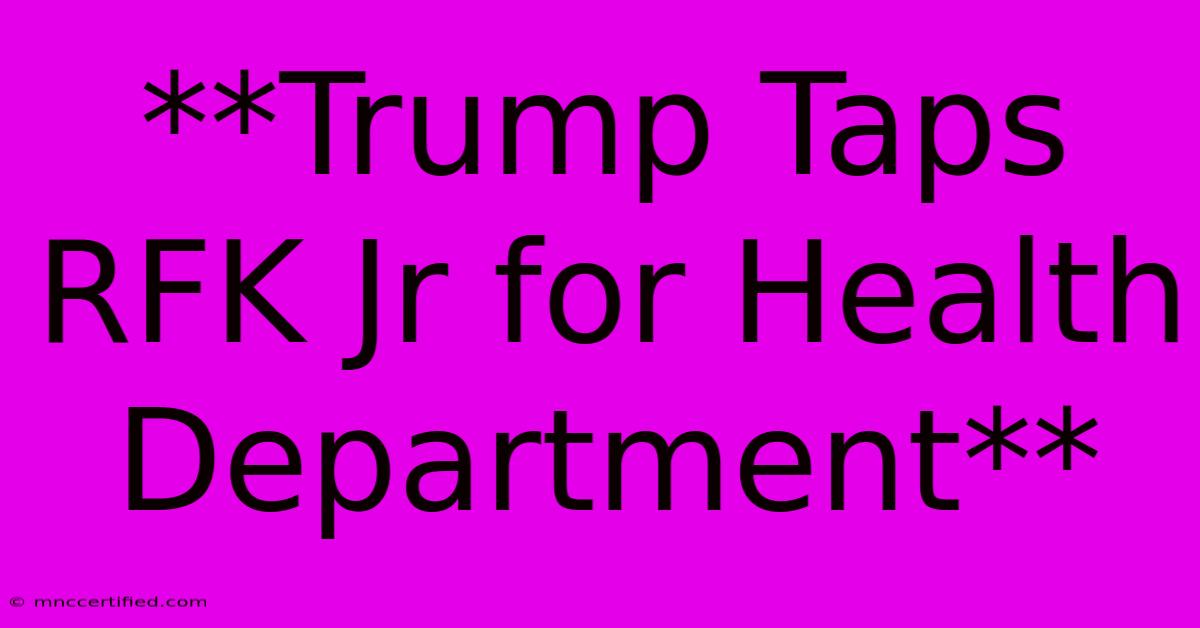**Trump Taps RFK Jr For Health Department**

Table of Contents
Trump Taps RFK Jr. for Health Department: A Deep Dive into the Controversy
The news that Donald Trump is considering Robert F. Kennedy Jr. for a position within the Department of Health and Human Services (HHS) has sent shockwaves through the political and medical communities. This unexpected move sparks intense debate, raising crucial questions about policy, public health, and the future direction of healthcare in the United States. This article will explore the potential implications of this controversial appointment, examining the arguments for and against it.
Understanding the Controversy: RFK Jr.'s Anti-vaccine Stance
The primary source of controversy surrounding Robert F. Kennedy Jr.'s potential appointment stems from his outspoken and widely criticized anti-vaccine views. He has publicly voiced skepticism about the safety and efficacy of vaccines, spreading misinformation that has been linked to decreased vaccination rates and the resurgence of preventable diseases. This stance directly contradicts the overwhelming scientific consensus supporting vaccination as a crucial public health measure.
The Scientific Consensus vs. RFK Jr.'s Claims
The scientific community overwhelmingly supports the safety and effectiveness of vaccines. Numerous peer-reviewed studies and decades of research demonstrate the significant role vaccines play in preventing infectious diseases. Organizations like the Centers for Disease Control and Prevention (CDC) and the World Health Organization (WHO) consistently advocate for vaccination as a cornerstone of public health. RFK Jr.'s claims, however, often contradict this evidence, promoting unsubstantiated theories and conspiracy narratives. This stark contrast fuels the intense opposition to his potential appointment.
Potential Implications for Public Health
If appointed to a position within the HHS, RFK Jr.'s influence could have profound and potentially detrimental consequences for public health initiatives. His anti-vaccine stance could undermine public trust in vaccination programs, leading to lower vaccination rates and a higher risk of outbreaks of preventable diseases. This could disproportionately affect vulnerable populations, such as children and the elderly.
Erosion of Trust in Public Health Institutions
The appointment could also erode public trust in established public health institutions and experts. Having someone with such a demonstrably flawed understanding of vaccine science in a position of authority could create confusion and sow discord, potentially undermining vital public health campaigns.
Arguments in Favor of the Appointment (A Counterpoint)
While the majority of the opposition is focused on RFK Jr.'s anti-vaccine stance, some might argue that his experience and connections could offer certain benefits. Proponents might point to his advocacy work on environmental issues or his extensive network within political circles. However, these arguments are overshadowed by the serious concerns about his views on public health.
Weighing the Risks and Rewards
Any potential benefits of his appointment are significantly outweighed by the considerable risks posed by his anti-vaccine views. The potential harm to public health far outweighs any perceived advantages. A decision to appoint him would send a deeply troubling message about the administration's commitment to scientific evidence and public health.
The Future of Healthcare Policy Under Potential Trump Administration
The potential appointment of RFK Jr. highlights the ongoing debate surrounding the role of science and evidence in policymaking. This situation underscores the importance of critical thinking, media literacy, and reliance on credible sources of information when evaluating public health claims. The outcome of this situation will significantly impact the future direction of healthcare policy in the United States.
Conclusion: A Decision with Far-Reaching Consequences
The decision of whether or not to appoint Robert F. Kennedy Jr. to a position within the HHS is one with far-reaching consequences. The potential damage to public health from his anti-vaccine stance is immense, and the decision will serve as a critical test of the administration's commitment to evidence-based policy. The controversy serves as a stark reminder of the importance of scrutinizing information sources and the critical role scientific evidence plays in shaping effective public health strategies. This situation will undoubtedly continue to be debated and analyzed for years to come.
Keywords: Robert F. Kennedy Jr., RFK Jr., Donald Trump, HHS, Department of Health and Human Services, Anti-vaccine, Vaccination, Public Health, Vaccine Safety, Misinformation, Conspiracy Theories, Healthcare Policy, Trump Administration, Political Controversy, Scientific Consensus, CDC, WHO.

Thank you for visiting our website wich cover about **Trump Taps RFK Jr For Health Department**. We hope the information provided has been useful to you. Feel free to contact us if you have any questions or need further assistance. See you next time and dont miss to bookmark.
Featured Posts
-
Nz Mps Use Haka To Protest In Parliament
Nov 15, 2024
-
How Much Does A Tooth Bonding Cost
Nov 15, 2024
-
Longoria Family Exits Us Citing Dystopian State
Nov 15, 2024
-
Novembers Columbus Full Moon Forecast
Nov 15, 2024
-
Huge 00s Rapper Announces Irish Show
Nov 15, 2024